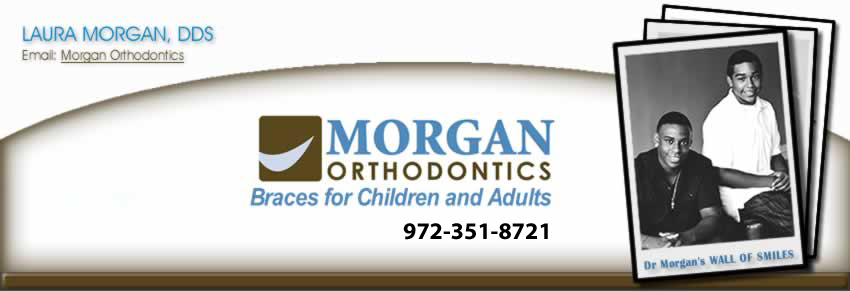New Patients
Welcome to our practice! We are so glad to have you.
Before your first visit, please print and complete the New Patient Forms (pdf) and bring them with you to your appointment. Thanks!
Dr. Laura Morgan's Complimentary Consultation (The first visit)
During the complimentary consultation, Dr. Morgan will examine the teeth and bite which will allow her to diagnose any problems. Any concerns regarding the teeth and bite will be discussed with you and your family. If treatment is needed, she will discuss treatment options and estimated treatment times; the treatment coordinator will discuss flexible financing and scheduling options with you. Handouts of the findings and options are provided so that you may review them and make an informed decision about your treatment at your convenience.
When Treatment Begins
When ready to begin orthodontic treatment, initial records are taken. Records include radiographs, photographs, and impressions for study models. Your general dentist may be contacted to help in providing you with the best dental care possible.
Life With Braces
Following is a review of the instructions provided during your bracket placement appointment.
Eating with Braces
You are able to eat almost anything during orthodontic treatment due to advancements in the materials used to bond (glue) the brackets to the teeth. You are cautioned about:
- Foods you have to bite into: corn on the cob, apples, carrots, ribs –these should be cut off the cob or rib or cut into bite size pieces and chewed with the back teeth
- Hard foods: ice, unpopped popcorn kernels, nuts, candy, etc.
- Sticky foods: caramels, taffy, etc.
- Chewing on hard things (pens, pencils, fingernails)
These items can damage braces which can cause treatment to take longer. You are encouraged to chew gum containing the sweetner Xylitol. Research has shown Xylitol to not only reduce decay but to prevent decay on teeth. Xylitol is contained in many major brands of gum. The pressure of chewing gum can often reduce soreness after an orthodontic adjustment.
Brushing
It is very important to brush and floss regularly when you have braces so the teeth and gums are healthy when orthodontic treatment is complete. Patients who do not keep their teeth clean can develop permanent scars around the brackets. When treatment begins, you receive oral hygiene instructions and tools necessary to keep the teeth healthy. Oral hygiene is checked at each appointment and reviewed as necessary. You must see your general dentist every 6-months during active orthodontic treatment for cleanings and exams. Your dentist and orthodontist work together to keep your teeth healthy throughout treatment, but daily patient care is essential.
Dental Care
Regular dental visits, including cleanings at least every 6 months, are needed throughout orthodontic treatment.
General Soreness
When you get your braces, you may feel a general soreness in your mouth and your teeth may be tender to biting pressures for three to five days. This can be relieved by rinsing your mouth with warm, salt water. Dissolve one teaspoon of salt in eight ounces of warm water, and rinse your mouth vigorously. If the tenderness is severe, take whatever you normally take for headache or similar pain. The lips, cheeks, and tongue may also become irritated for one to two weeks as they toughen and become accustomed to the surface of the braces. We will show you how to put wax (which we provide) on the braces to relieve these symptoms. As mentioned previously, some patients feel chewing gum reduces soreness.
Loose Wire or Bracket
Don't be alarmed if a wire or bracket comes loose. This happens occasionally. If a wire protrudes and is irritating, use a blunt instrument(back of spoon or the eraser end of a pencil) and carefully push the irritating wire under the archwire. Simply get it out of the way. If irritation to the lips or mouth continues, place wax on the wire to reduce the annoyance. If a bracket comes loose, continue to brush around it and use wax to keep the lip comfortable. If a bracket comes off, save it and bring it with you to the office. Call our office as soon as possible for an appointment to check and repair the appliances.
In Case of Emergency
True orthodontic emergencies are very rare, but when they do occur, we are available to you. As a general rule, you should call the office when you have an emergency so we can assist you.


